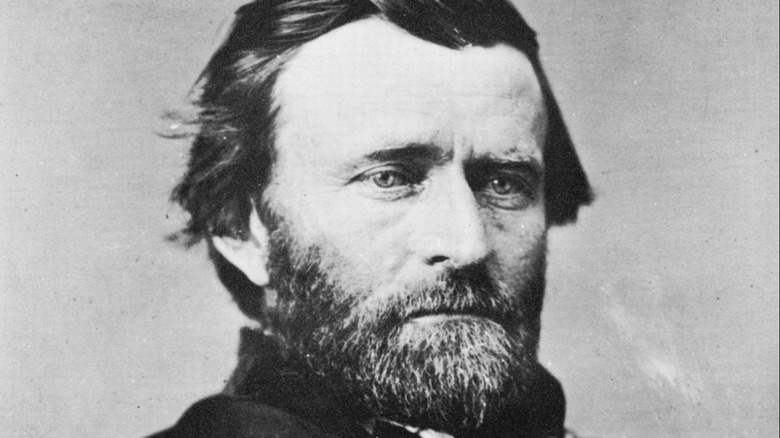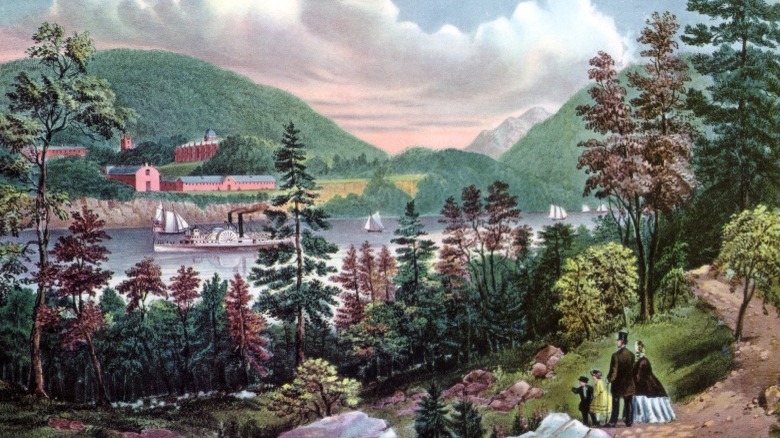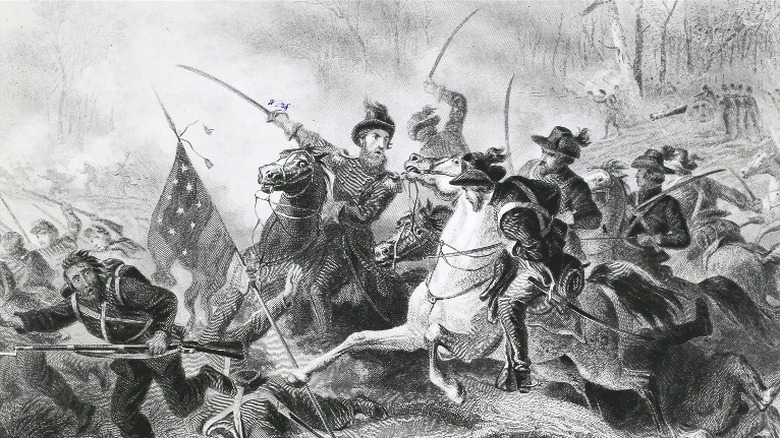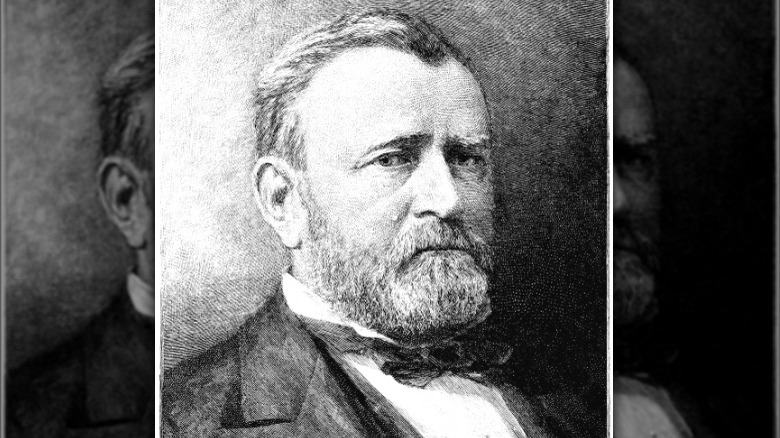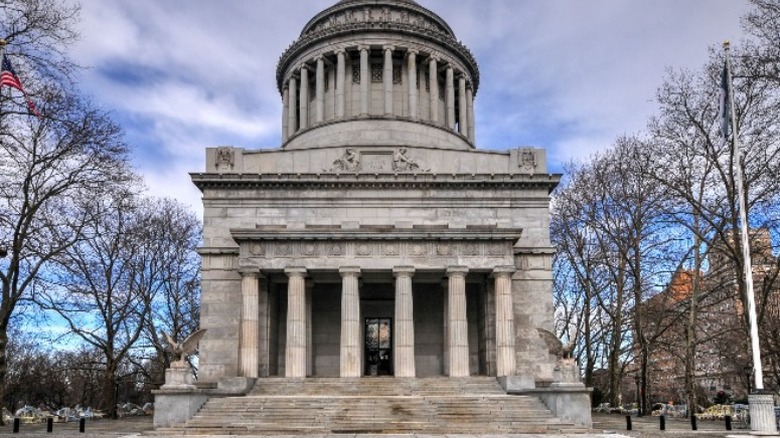How Ulysses S. Grant Lost All His Money
During the 245 year history of the United States, there have been 46 presidents who have run the country. Some of them, like George Washington and John F. Kennedy, are extremely well known. Alternatively, the likes of William McKinley and William Henry Harrison are often not studied as extensively. Then you have the guys that kind of fall in the middle like Ulysses S. Grant.
Though he isn't as famous as Washington or Lincoln, Grant was still a significant historical figure. He was many things in his lifetime, including a West Point graduate, a Civil War general, and President of the United States. Grant even managed to get his portrait onto official U.S. currency — the $50 bill — that is still used today. This last little fact is kind of ironic when you consider that at the end of his life, Grant was essentially penniless. Read on to learn about the unusual ending to the life of this U.S. president.
Early Life
Fun fact: Ulysses S. Grant was not born Ulysses S. Grant. According to History, he was actually born Hiram Ulysses Grant on April 27, 1822. His father was a tanner and a businessman who moved his family to Georgetown, Ohio. Grant grew up there and had a somewhat boring childhood, as he reportedly had more of the shy and quiet personality traits exhibited by his mother, per Biography.
So how did a reserved and fairly unremarkable kid become the ruler of the free world? Apparently, it helps when your dad decides that if you don't want to go into the family business, you're going into the military. Even better when he pulls some strings for you to go to the United States Military Academy at West Point. Yeah, that West Point. It's also important to note that it was because of a misspelling of his name on his application to this military school that he started going by Ulysses S. Grant.
Military Career
Like most military academies, West Point had (and still has) extremely high expectations of those who enter their institution. Unfortunately, Ulysses S. Grant's performance was kind of mediocre, with horseback riding being the only area in which he really excelled (per History). He still managed to graduate in 1843, and he was placed with the 4th U.S. Infantry as a brevet second lieutenant.
A year after being stationed with his unit in Missouri, Grant met the sister of one of his classmates, Julia Dent. He proposed, and she accepted, but before they could get hitched, he was deployed to serve in the Mexican-American War. During his deployment, he served under another future U.S. president, Zachary Taylor. Though he learned a lot about war strategy and was recognized for his bravery in combat, Grant reportedly thought that the war was wrong since he believed it was only being fought to expand slavery in the U.S.
A Great Civil War General
Despite his misgivings about the Mexican-American War, Ulysses S. Grant did continue to serve in the U.S. military. When he found the time in 1848 to finally marry Julia Dent, he returned to duty, which kept him separated from his family (per Biography). Over the next 5 years, Ulysses S. Grant was promoted to captain, but the stress of failed business ventures and distance from his family caused him to develop a drinking habit that would follow him for the rest of his life.
In 1854, Grant actually resigned from the military and returned to his family. Unfortunately, civilian life did not suit him well, and when the Civil War broke out in 1861, Grant voluntarily returned to service. He received his appointment to command the 21st Illinois Volunteer regiment. This regiment would take part in the battles of Fort Donelson and Fort Henry, two significant battles at the beginning of the war. It was also during this time that Grant moved up the ranks to major general of volunteers and earned his nickname, "Unconditional Surrender Grant."
Grant went on to play an important role in other significant Civil War battles like the Battle of Shiloh and the Battle for Chattanooga. Following the end of the war in 1865, Grant was appointed the country's first four-star full general and was a national hero (per History).
From War Hero to President
You would think after managing to help keep the country from falling apart, Ulysses S. Grant would get a break. For General Grant, this was not the case. Despite the Union victory during the war, drama ensued within the government in Washington during the postwar period known as Reconstruction.
After President Abraham Lincoln was assassinated in 1865, he was replaced by his vice president, Andrew Johnson. Almost as soon as the war ended, conflict was brewing between Johnson and the Radical Republicans in Congress over how to deal with Reconstruction in the south (per History). It was this disagreement and the impeachment of President Johnson that would ultimately lead to Ulysses S. Grant receiving the nomination for the Republican Party. Johnson also failed to remain the candidate for the Democratic Party and was replaced by Horatio Seymour, who ran against Grant in the 1868 election.
Grant defeated his opponent by a landslide in both the electoral and popular votes. He was sworn in as the 18th President of the United States on March 4, 1869. Grant's subsequent presidency was a tumultuous time as he was responsible for trying to reunite a war-torn country in a peaceful manner.
Financial ruin
After serving his two terms as president, it's easy to imagine Ulysses S. Grant finally getting to leave the chaos of war and politics behind to live out the rest of his days in peace. Unfortunately, fate had other plans for him, and the way his story ended was rather tragic. According to Finance & Markets, Grant did have a brief time of happiness when he traveled Europe for a few years. After returning to the States, he needed to replenish the money he had spent from his savings. Sadly, it was his attempts to make more money that resulted in financial disaster.
Grant initially attempted to invest in the Mexican Southern Railroad, which eventually went bankrupt. However, it was his last-ditch effort for money that ended in financial ruin — Grant invested in a brokerage firm run by a man named Ferdinand Ward, who, unbeknownst to him, was a swindler of the worst kind. Ward eventually ran off with all of his investors' money, including Grant's, leaving him completely broke.
Luckily, a little bit of help came from an unlikely source — writer and author Mark Twain. Grant decided to publish his memoirs, and Twain was happy to help. Grant managed to finish his manuscript a few days before his death from throat cancer on July 23, 1885 (via History). Though he never saw the financial outcome of his memoirs, it became a huge success, thus ensuring his family's financial security for years to come.
